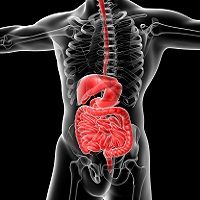Article
Treatment with Ivacaftor Can Improve Digestive Function and Potentially Reduce the Risk of Exocrine Pancreatic Insufficiency in Some Patients with Cystic Fibrosis
Author(s):
Patients with the cystic fibrosis transmembrane conductance regulator gating mutation G551D have insufficient ion transport due to reduced channel-open probability. New information suggests that increased ion transport reduces disease burden in the pancreas, which prevents cystic fibrosis patients from digesting food properly and leads to exocrine pancreatic insufficiency in up to 90% of all cases.

A pair of 48-week trials indicate that the drug ivacaftor (Kalydeco) ameliorates nutritional deficiencies in cystic fibrosis patients with a particular genetic mutation.
Researchers randomized 105 patients who were 20 years old or younger on a 1-to-1 basis between ivacaftor 150 mg or placebo every 12 hours for 48 weeks. Ivacaftor use was associated with a mean bodyweight increase of 4.9 kg and placebo use was associated with a mean bodyweight increase of 2.2 kg (p=.0008). The extra weight increase pushed the growing children in the ivactor group toward normal weight and body mass index (BMI), while the children in the placebo group actually lost ground during the study period. Indeed, at week 48, change from baseline in mean weight-for-age z-score was 0.29 in the vacaftor group and −0.06 in the placebo group (p < .0001); change in mean BMI-for-age z-score was 0.26 in the ivacaftor group and −0.13 in the placebo group (p < .0001).
Another 108 patients who were 21 years old or older were also randomized on a 1-to-1 basis between the same 2 regimes. Among these adults, ivacaftor use was associated with a mean bodyweight increase of 2.7 kg and placebo use was associated with a mean bodyweight loss of 0.06 kg (p<.001). Those numbers translated into a mean increase of 0.9 kg/m2 in the BMI of ivacaftor group members and a mean BMI decrease of 0.1 kg/m2 among placebo group members(p = .0003).
All patients completed the CF Questionnaire-Revised at the beginning and end of the study, and ivacaftor use was associated, in both children and adults, with improvements in body image, perceptions of eating and a belief that weight gain was possible.
The 2 studies also kept track of patient lung function and sweat chloride and found that ivacaftor use was associated with significant improvements in both. The research team, which published the new trial results in Digestive Diseases and Sciences, looked to see whether the patients whose lung function improved the most tended to be the patients who gained the most weight, but there was no linear connection between increases in bodyweight and improvements in lung function.
All of the patients in the study had the cystic fibrosis transmembrane conductance regulator gating mutation G551D, which prevents sufficient ion transport due to reduced channel-open probability. Ivacaftor helps such patients by increasing the channel-open probability and thus increasing ion transport.
Trial results published before the new paper have focused mostly on the considerable positive effect the drug has in the lung function of cystic fibrosis patients with the relevant mutation. This latest information suggests that increased ion transport also reduces disease burden in the pancreas, which prevents cystic fibrosis patients from digesting food properly and leads to exocrine pancreatic insufficiency in 85% to 90% of all cases.
Unfortunately, ivacaftor has only been shown to work in the roughly 5% of all cystic fibrosis patients who have the G551D mutation. Some ongoing trials are investigating whether the drug can provide similar benefits to a far greater percentage of patients if it is used in combination with other medications, but, for the time being, the potential market for the drug consists of only a few thousand people the world over.




